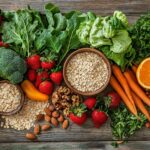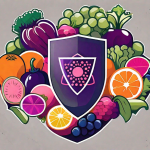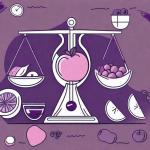This blog post explores the connection between diet and cancer, emphasizing the significant role dietary choices play in cancer prevention. It highlights how certain foods possess cancer-fighting properties due to their nutrient content, such as antioxidants, fiber, and healthy fats. Cruciferous vegetables, berries, garlic, turmeric, green tea, and leafy greens are among the top cancer-fighting foods recommended for inclusion in the diet. Additionally, adopting comprehensive dietary patterns like the Mediterranean diet, which emphasizes whole foods, can further reduce cancer risk. The post provides practical tips for incorporating cancer-preventive foods into daily meals, encouraging small changes for long-term health benefits. Ultimately, the message underscores the importance of prioritizing a nutrient-rich diet as a powerful tool in cancer prevention, complementing other healthy lifestyle choices.
Cancer remains one of the world’s most pressing health challenges, affecting millions each year. While various factors contribute to cancer risk, diet plays a significant and often underestimated role. This blog post delves into the connection between diet and cancer, highlighting how certain dietary choices can either elevate or reduce your risk. We aim to empower you with knowledge and practical tips to make informed dietary choices for your health and well-being.
Understanding the Cancer-Diet Connection
Cancer is a complex disease influenced by a myriad of factors, including genetics, environment, and lifestyle. Among these, diet stands out as a modifiable risk factor that you have control over every day. Numerous studies have shown that diets rich in processed foods, red and processed meats, and high-calorie, low-nutrient foods can increase the risk of certain types of cancer. Conversely, diets abundant in fruits, vegetables, whole grains, and lean proteins have been linked to a reduced risk of cancer.
But how does food influence cancer risk? It’s all about the nutrients – or lack thereof. Foods high in antioxidants, fiber, and healthy fats can protect your cells from damage, reduce inflammation, and promote overall health, creating an environment less conducive to cancer development.
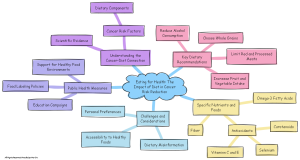
Top Cancer-Fighting Foods to Include in Your Diet
When it comes to cancer prevention, certain foods have been found to possess powerful anti-cancer properties. Including these foods in your diet can provide a significant health boost.
One group of cancer-fighting foods that has gained a lot of attention is cruciferous vegetables. These vegetables, including broccoli, cauliflower, and Brussels sprouts, are not only delicious but also rich in compounds that can combat cancer cells. Sulforaphane, a compound found in broccoli, has been shown to inhibit the growth of cancer cells and even induce their death. Additionally, cruciferous vegetables are high in fiber, which helps support a healthy digestive system and may reduce the risk of colon cancer.
Berries, such as blueberries and strawberries, are another group of cancer-fighting foods that should not be overlooked. These colorful fruits are packed with antioxidants, which are substances that protect our cells from damage caused by harmful free radicals. Free radicals can cause oxidative stress, leading to DNA damage and potentially cancerous cell growth. By consuming berries regularly, we can provide our bodies with a steady supply of antioxidants, helping to prevent cancer and other chronic diseases.
Garlic, a staple ingredient in many cuisines, is not only known for its distinct flavor but also for its potential cancer-fighting properties. Garlic contains sulfur compounds, such as allicin, which have been shown to have anti-cancer effects. These compounds can inhibit the growth of cancer cells and even promote their death. Furthermore, garlic has been linked to a reduced risk of several types of cancer, including colorectal and stomach cancer.
Turmeric, a spice commonly used in Indian cuisine, has gained popularity for its potent anti-inflammatory and antioxidant properties. Curcumin, the active compound in turmeric, has been extensively studied for its potential cancer-fighting effects. It has been shown to inhibit the growth of cancer cells, block the formation of blood vessels that supply tumors, and even induce cancer cell death. Adding turmeric to your meals or consuming it in supplement form can be a great way to incorporate this powerful cancer-fighting spice into your diet.
Green tea, a beverage enjoyed by many cultures around the world, is not only refreshing but also packed with health benefits. It contains a group of antioxidants called catechins, which have been shown to have anti-cancer properties. These antioxidants can help protect cells from damage, reduce inflammation, and inhibit the growth of cancer cells. Studies have suggested that regular consumption of green tea may lower the risk of several types of cancer, including breast, prostate, and colorectal cancer.
Leafy greens like spinach and kale are not only nutritious but also excellent additions to a cancer-fighting diet. These greens are rich in vitamins, minerals, and antioxidants that can help protect against cancer. They are particularly high in carotenoids, a group of antioxidants that give these vegetables their vibrant colors. Carotenoids have been linked to a reduced risk of various cancers, including lung, breast, and stomach cancer. Including a variety of leafy greens in your meals can provide a wide range of nutrients that support overall health and well-being.
By incorporating a variety of these cancer-fighting foods into our meals, we can fortify our bodies against cancer and promote optimal health. Remember to consult with a healthcare professional or registered dietitian to ensure that these foods fit well into your individual dietary needs and health goals.
Dietary Patterns for Prevention: Beyond Individual Foods
Focusing on individual superfoods is great, but adopting a comprehensive dietary pattern can be even more effective in cancer prevention. Diets such as the Mediterranean diet, which emphasizes fruits, vegetables, whole grains, lean proteins, and healthy fats (like olive oil), have been consistently linked to lower cancer risks. This diet is not only nutritious but also sustainable and enjoyable, making it a practical choice for long-term health.
Remember, a cancer-preventive diet isn’t about strict rules or deprivation – it’s about balance and making more healthful choices most of the time. A well-rounded diet that encompasses a variety of foods is essential for cancer prevention. It’s not just about eating a few cancer-fighting foods here and there; it’s about creating a dietary pattern that supports our overall health and well-being. This means incorporating a wide range of fruits, vegetables, whole grains, lean proteins, and healthy fats into our daily meals.
Why is it important to look beyond individual foods? Well, our bodies are complex systems that require a diverse array of nutrients to function optimally. By focusing on a variety of foods, we can ensure that we are getting all the essential vitamins, minerals, and phytochemicals that our bodies need to fight off cancer cells and maintain overall health.
In addition to including a wide range of cancer-fighting foods, it’s equally important to limit the consumption of processed foods, sugary drinks, and red meats. These foods have been linked to an increased risk of cancer and should be consumed in moderation, if at all. By reducing our intake of these unhealthy options, we can further decrease the likelihood of developing cancer.
But what exactly does a balanced and diverse dietary pattern look like? It could involve starting your day with a bowl of oatmeal topped with fresh berries and a sprinkle of nuts, followed by a colorful salad for lunch, packed with leafy greens, tomatoes, cucumbers, and avocado. For dinner, you might enjoy a grilled salmon fillet with a side of roasted vegetables and quinoa. And don’t forget to snack on a handful of almonds or carrot sticks throughout the day for an extra dose of nutrients.
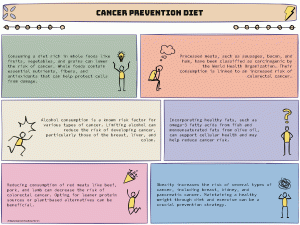
By adopting a balanced and diverse dietary pattern, we can enhance our body’s defense mechanisms and decrease the likelihood of developing cancer. It’s not just about individual foods, but rather the synergy between them and the overall dietary pattern that can make a significant impact on our health. So, let’s strive for a colorful plate filled with a variety of cancer-fighting foods and create a foundation for a healthier future.
Practical Tips for a Cancer-Preventive Diet
Adopting a new eating pattern can be daunting, but it doesn’t have to be. Here are some practical tips to help you get started:
Start Small: Make gradual changes. Swap out processed snacks for fresh fruits, or replace white bread with whole-grain alternatives.
Plan Your Meals: Meal planning can help you make healthier choices and reduce the temptation to resort to fast food.
Cook at Home: Preparing your own meals gives you complete control over what goes into your food.
Experiment with Recipes: Try new recipes that focus on cancer-fighting ingredients. Cooking can be fun and a great way to explore new flavors and cuisines.
Remember, your diet is a powerful tool in your cancer prevention arsenal. While it’s not a foolproof strategy, combining a healthy diet with other lifestyle choices like regular exercise, maintaining a healthy weight, and avoiding tobacco can significantly reduce your risk of cancer.
Eating for Health: The Impact of Diet in Cancer Prevention
In conclusion, our diet plays a significant role in cancer prevention. By including cancer-fighting foods and adopting a well-rounded dietary pattern, we can strengthen our bodies’ natural defenses against this disease. Implementing practical tips, such as meal planning and making healthier snack choices, can make these dietary changes manageable and sustainable in the long run. Let’s prioritize our health by nurturing our bodies with nutrient-rich foods and embracing a lifestyle that supports cancer prevention. Remember, every small, positive change in our diet can lead to significant impacts on our overall well-being.



